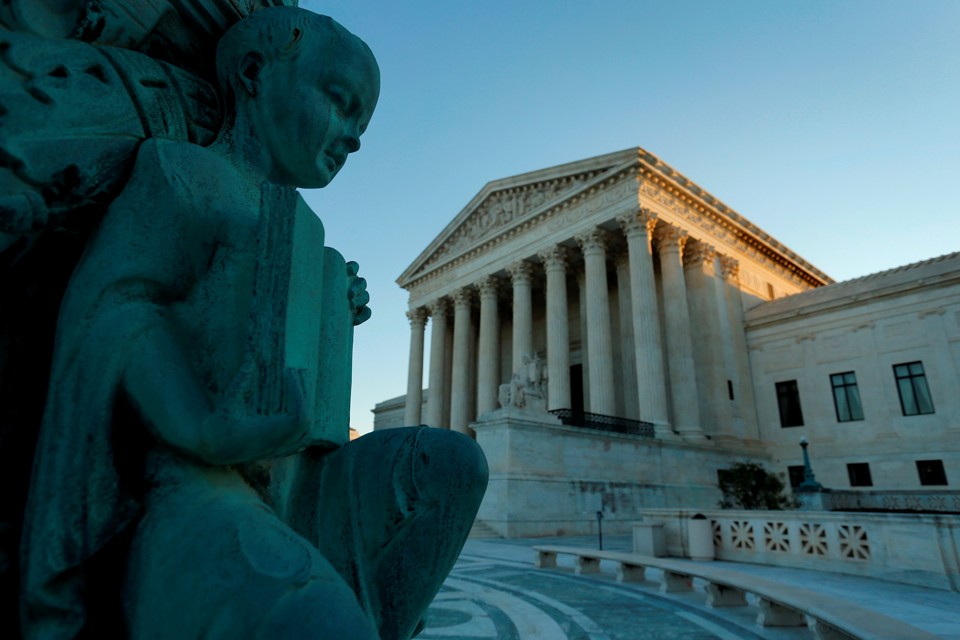Results 1 to 4 of 4
Thread Information
Users Browsing this Thread
There are currently 1 users browsing this thread. (0 members and 1 guests)
-
05-08-2017, 11:02 PM #1
Will the Supreme Court Defend Citizenship?
Will the Supreme Court Defend Citizenship?
The federal government wants broad authority to strip naturalized immigrants of their hard-won status.

May 2, 2017
Very few Americans have heard of Afroyim v. Rusk, a 1967 U.S. Supreme Court case on citizenship, but all Americans can perhaps be grateful for it. Most of the Court’s landmark decisions are famous for their tangible effects, like dismantling racial segregation or legalizing abortion rights. Afroyim’s impact can instead be felt by what hasn’t happened: No natural-born Americans have been involuntarily stripped of their citizenship—and the protections it carries—since the ruling.
Naturalized Americans are also generally protected by Afroyim, with one notable exception: if they lied or misled a consular officer during the process to obtain their citizenship. That gap was the subject of contentious questioning by the justices recently in a case that could grant the Trump administration broad powers to strip naturalized Americans of their cherished status.
The case itself, Maslenjak v. United States, began under the Obama administration. Diana Maslenjak was born in a part of Yugoslavia that became part of Bosnia. Yugoslavia was a multiethnic society for most of the 20th century until its collapse in the 1990s ushered in a bloody decade of sectarian strife. Maslenjak and her children sought and received refugee status in the United States. During her interviews with a U.S. consular official in 1998, Maslenjak said she feared persecution as an ethnic Serb in Muslim-majority Bosnia. That led the U.S. government to grant her and her family’s request in 1999.
But she also said that while she had fled and then returned to Bosnia with her children from 1992 to 1997 before leaving again, her husband had stayed in Serbia during that time to avoid serving in the Bosnian Serb military. U.S. officials later discovered that was untrue: Not only did Maslenjak’s husband return to Bosnia with his family during that period, but he also served in the Bosnian Serb military.
Those forces were accused of numerous atrocities against Bosnia’s Muslim population during the conflict, although there’s no evidence her husband participated in any of them.
In 2006, U.S. immigration officials arrested her husband for not disclosing his service on an immigration application. Maslenjak applied for citizenship one week later. The naturalization application asked her if she had “knowingly given false or misleading information to any U.S. government official while applying for any immigration benefit or to avoid deportation, exclusion, or removal” or if she had “lied to any U.S. government official to gain entry or admission into the United States.” She answered “no” both on the written form and during an interview under oath.
Maslenjak received her citizenship in 2007, but was subsequently indicted by a federal grand jury in 2013 when officials eventually realized she made false statements during the naturalization process. At trial, the federal government argued Maslenjak’s claims in 1998 about her husband’s military service helped her get refugee status. She countered that she received refugee status because of her fear of persecution, and her claims about her husband were ultimately immaterial. The trial judge told the jury, however, that a false statement “doesn’t have to be material” to violate federal law.
Based on those instructions, the jury then found Maslenjak guilty on two counts, one of which carries an automatic penalty of denaturalization. When the Sixth Circuit Court of Appeals affirmed the verdict in April 2016, it created a split between itself and four other federal appellate courts on the immateriality standard. The Supreme Court agreed to hear the case in January to resolve the incongruity.
“It gives the federal government too much leverage and too much power over something that is as precious as citizenship.”
Whether a statement must be material or immaterial in denaturalization proceedings might seem arcane. But a more relaxed standard could put the citizenship of tens of thousands of naturalized Americans in peril for even relatively trivial falsehoods. That includes not only those who’ve come into the United States as refugees, but the millions of ordinary immigrants as well. At oral arguments last week, the justices quickly grasped the implications. Chief Justice John Roberts opened with a hypothetical question for Robert Parker, an assistant solicitor general representing the federal government, by noting he had, “some time ago outside the statute of limitations,” driven over the speeding limit.
“You say that if I answer that question ‘No,’ 20 years after I was naturalized as a citizen, you can knock on my door and say, ‘Guess what, you’re not an American citizen after all,’” Roberts told Parker. “Is that right?” Parker said it was. “Oh, come on,” Roberts scoffed.
Justice Sonia Sotomayor then jumped in with a question about the naturalization form’s request to list nicknames. What if she declined to list an embarrassing one given to her by classmates during her childhood, she asked? Parker tried to push back against her hypothetical by saying he didn’t think that’s what the question had in mind. “Oh, but isn’t that the point?” Justice Stephen Breyer chimed in.
“You’ve read the briefs. The questions are unbelievably broad.”
Justice Elena Kagan then went next. “I am a little bit horrified to know that every time I lie about my weight, it has those kinds of consequences,” she told Parker. “Only under oath,” he replied. Most of the oral arguments adopted an almost lighthearted tone as some of the justices bounced various hypotheticals around. But when Parker later noted that denaturalization wasn’t a permanent bar on citizenship and that reapplication could be possible in five years, Justice Anthony Kennedy offered a stern rebuke.
“It seems to me that your argument is demeaning the priceless value of citizenship,” he told Parker. “You say, ‘Oh, he just restored her former status.’ That’s not what our cases say. That’s not what citizenship means. You’re arguing for the government of the United States, talking about what citizenship is and ought to mean.”
Adopting the Sixth Circuit’s standard nationwide would have serious consequences, immigration lawyers told me. “It gives the federal government too much leverage and too much power over something that is as precious as citizenship,” said Jeremy McKinney, an attorney and board member of the American Immigration Lawyers Association. The Maslenjak case focuses on criminal denaturalization, but McKinney noted the Sixth Circuit’s standard could also lower the threshold for administrative denaturalization, in which the Department of Homeland Security can revoke citizenship on technical grounds shortly after it’s granted, and judicial denaturalization, which can be brought by federal prosecutors in a civil proceeding.
Lowering the barriers for denaturalization would also run counter to what the Court set forth in Afroyim. “Citizenship is no light trifle to be jeopardized any moment Congress decides to do so under the name of one of its general or implied grants of power,” Justice Hugo Black wrote for the majority. “The very nature of our free government makes it completely incongruous to have a rule of law under which a group of citizens temporarily in office can deprive another group of citizens of their citizenship.”
Not everyone in American politics shares the absolutist view of citizenship. On the campaign trail, President Trump called for an end to birthright citizenship as guaranteed under the Fourteenth Amendment. His target was so-called “anchor babies,” a derisive term for children of immigrants who are born on U.S. soil. And he wasn’t alone: Other Republican presidential contenders, ranging from libertarian-leaning Rand Paul to devoutly conservative Rick Santorum, also called for birthright citizenship to be scaled back.
Other proposals that would erode citizenship’s inseparability lurk in the background. Texas Senator Ted Cruz, another former GOP presidential candidate, has repeatedly introduced legislation that would strip the citizenship of Americans who join ISIS. Australia approved a measure targeting dual citizens in 2015, and British legislators have also made similar proposals. A few weeks after his election last
November, Trump tweeted that protesters who burn the American flag should face denaturalization.
These proposals are largely quiescent for the moment. But they could still return to the national conversation, whether as part of Trump’s continued efforts to restrict immigration or in sudden response to the next terrorist attack. Until then, Maslenjak v. United States may give the justices an opportunity to reaffirm citizenship’s standing in American civic life.
https://www.theatlantic.com/politics...lenjak/525000/
Support our FIGHT AGAINST illegal immigration & Amnesty by joining our E-mail Alerts athttp://eepurl.com/cktGTn
-
05-08-2017, 11:09 PM #2
Naturalized citizens can and should lose their citizenship if they lied in their application or violated their oath.
A Nation Without Borders Is Not A Nation - Ronald Reagan
Save America, Deport Congress! - Judy
Support our FIGHT AGAINST illegal immigration & Amnesty by joining our E-mail Alerts at https://eepurl.com/cktGTn
-
05-09-2017, 01:22 AM #3Junior Member

- Join Date
- May 2017
- Posts
- 2
Obtaining citizenship through lying is fraudulently obtaining citizenship and should be revoked. If a person is willing to put their citizenship at risk for something so trivial then they do not cherish the very thing that some are crying about losing because of crimes and other they've committed! Enough already! Just follow the letter of the law and people will 'cherish' their citizenship more and not take chances with it!! Not following the letter of the law makes people know that they don't have to cherish citizenship because laws don't apply and they do whatever it is they want to do.
-
05-09-2017, 12:46 PM #4
Hey, welcome to ALIPAC AllAmericans! I completely agree with what's been said above. I knew when I got my Canadian citizenship how precious it is. Any and ALL lying or cheating to gain citizenship is morally and ethically wrong, just as jumping a border illegally is.

Similar Threads
-
The Supreme Court Needs to Settle Birthright Citizenship
By JohnDoe2 in forum illegal immigration News Stories & ReportsReplies: 1Last Post: 07-25-2016, 01:08 AM -
Clinton blasts 'unacceptable' Supreme Court deadlock and will defend Obama's program
By lorrie in forum General DiscussionReplies: 11Last Post: 06-24-2016, 09:40 AM -
Could Arizona voter citizenship law go to Supreme Court?
By JohnDoe2 in forum illegal immigration News Stories & ReportsReplies: 0Last Post: 06-21-2011, 08:41 PM -
Will Supreme Court take case on Obama's citizenship?
By AirborneSapper7 in forum Other Topics News and IssuesReplies: 0Last Post: 12-04-2008, 03:13 PM


 11Likes
11Likes LinkBack URL
LinkBack URL About LinkBacks
About LinkBacks




 Reply With Quote
Reply With Quote


Student suspended for using term ‘illegal alien’ in English class
04-16-2024, 01:30 PM in General Discussion